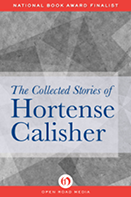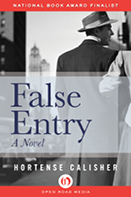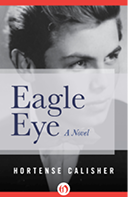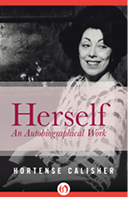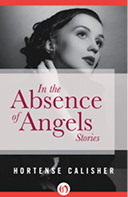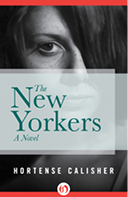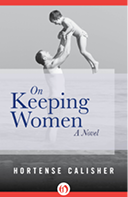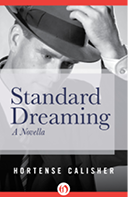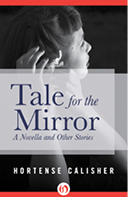In the Slammer With Carol Smith (26 page)
Read In the Slammer With Carol Smith Online
Authors: Hortense Calisher

We are the state within the state.
We send you this card——.
And I must now reply:
You alleyways that harbored me, who can shoulder your load alone? Do so, and isn’t it only a tramp’s bundle-on-a-stick?
Now I’m on the ward of the ordinary. Pray for me. That as I become workaday enough to buy a watch, which is not the worst of fates, I will do more by it than count my days. That I won’t merely luxuriate in what I believe. That when I’m old I won’t be frightened at what I’ve become.
Hell, it’s time. Not for either the 6 am or the 6 pm light to flick on; I know that much. By the time-sense deeper in the bone, independent of light, he should be back by now—shouldn’t he? This is the householder itch, the family unease that wants everybody safely in. Just so the day aunt used to stand in the candle-lit bay, waiting for the night aunt to return, a worm of worry extending from her bent form, but not affecting me. I knew my place. Yet one night I burst out jealously: ‘Why do you worry so about her?’ And the answer came from behind that crouched shape: ‘Because she has no fear.’ And like a bitter-lemon keynote I only now hear, ‘Nor do you.’
Will Martyn fear for me? Will I fear for him, the domestic drip-dripping on us like the spots of candle wax not found on the window-seat until the next day. ‘Candles are for company, but you don’t have company, why are you always burning them?’ a schoolmate said to me. ‘We have to get rid of them,’ I’d answered. ‘They’re from the blackout during a war.’
Repetition will woo Martyn and me, as it’s weaned me here. But I can imagine there’ll be enough of the bare. We’ll see to it. Unless the world gets there first. Which in one way or other it will. What do I know about the state of the world, except that it is us? In every house as in every alley—and at every grave. The sharpshooters are always anonymous.
While the keys held in common hang on the hook where one person left them—I see them up there, and the other leaves them behind. In trust. But why had he bothered to say he would halloo? A halloo is from afar. Has he too felt the doubleness already stealing like a sweet fog around us? Perhaps he’ll phone his doubts from the restaurant. Or, never having got to it, from the street. ‘Afar’ wouldn’t have to be Africa. Or not yet.
I drop to my knees, near the phone. Willing it to ring. Willing it not to, if the message is bad. There is a need, I’m sure, for—could one call it ‘singletude,’ as apart from living single? One would slip away now and then from the doubleness. Even in stealth, maybe. To walk, waist untwined, swinging in the alpine air of the lone meditation, ears stoppled against all communication from another skull. Only to come back sated, shivering with eagerness for the dual, as if reeled in on a tape. But one can’t urge that vision over a phone.
Then I hear it. A halloo, not far. As near as the window I rush to is to a lamppost four storys below. He and it are not a painting; there’s too much of him. He holds a wide, shallow bowl, covered in foil. Vinyl and string grocery bags depend from his one arm, and from around his neck; the wounded arm has none. He is a one-armed wall, offering a banquet. And he has company.
The Indian girl, in shiny black helmet, jumpsuit and boots, leans on the motorbike like an aviatrix. The bike has the cousin in tow. They are both looking up, but with the eyes only. Her helmet is too big for her, his too small for him.
Martyn manages a one-hand, three-fold motion. Signaling: these two—may I bring them up? For what’s in the bowl?
I spread my arms wide, wide.
Girl, bike, cousin spring to action. As she directs him to park the bike inside our door, I see they’ve swapped manners. She’s no longer polite. He is. As he up-ends the bike she blows me a kiss through the handlebars.
Martyn has already disappeared. Four stories, and that load. And the bike will have to be pulled up on the landing. Just enough time. I open the housedoor a crack.
There’s no straightening up to be done. Except for the empty crackerbox on the table. And the two cards lying there.
I’ll tuck them in the backpack pocket, where I put Carey’s check. Nuzzle the money as they will, they can’t sweeten it. But as papers of record they belong with it.
Not that I need to keep these soul-bytes in sight, like the calendar put on a shelf to remind you that the convenience store around the corner—the one that gives you credit, is trying to hang on. I always know who I am, and where; that’s been the trouble. I’m one of those. Sink to the depths and it’s because you know what you are. Or when you rise toward those heights you are almost capable of. I snap the pocket closed over the jumble that can’t be thrown away.
I hear the three coming nearer. Heavy steps. One burdened man, and one in tow, packages thumping against the rail. They sound like the movie music that signals Fate is creeping toward somebody’s come-uppance. The audience hopes to get its money’s worth.
The girl makes no noise. But I suspect her destiny, and the cousin’s as well. The clan will close over them, but not quite. There is after all the bike.
The door is flung wide. Martyn stands there, laden like the god of gifts, carrying the bowl that will make us cry. Been a long walk from Fourteenth Street, but he won’t let us see that. Does he know his destiny, this slightly wounded man? Does he know ours?
I am the record. That’s a destiny, as far as it goes. But something has been added. I have company.
Martyn’s face does not change at the sight of me. Warmed maybe, by what we’ve been through. But not astounded. The two faces flanking his are, the tiny one screwed in delight, the cousin’s still led by its nose.
Is that sheen on Martyn’s face sweat? Or pride?
I have remembered the bit of glory he held out to me. As I’ll remember the two cards, shining now in their dark pocket, with an incandescence once mine.
I am the bomb. I could run for parliament. From an inherited seat. Slap-slap and a smooth thrru-um, I am playing the drums.
For all of us.
So ends the record.
Now—the required statement:
Open the door, Carol, to Carol Smith.
Case closed.
Hortense Calisher (1911–2009) was born in New York City. The daughter of a young German-Jewish immigrant mother and a somewhat older Jewish father from Virginia, she graduated from Barnard College in 1932 and worked as a sales clerk before marrying and moving to Nyack, New York, to raise her family. Her first book, a collection of short stories titled
In the Absence of Angels
, appeared in 1951. She went on to publish two dozen more works of fiction and memoir, writing into her nineties. A past president of the American Academy of Arts and Letters and of PEN, the worldwide association of writers, she was a National Book Award finalist three times, won an O. Henry Award for “The Night Club in the Woods” and the 1986 Janet Heidinger Kafka Prize for
The Bobby Soxer
, and was awarded Guggenheim Fellowships in 1952 and 1955.
All rights reserved, including without limitation the right to reproduce this ebook or any portion thereof in any form or by any means, whether electronic or mechanical, now known or hereinafter invented, without the express written permission of the publisher.
This is a work of fiction. Names, characters, places, events, and incidents either are the product of the author’s imagination or are used fictitiously. Any resemblance to actual persons, living or dead, businesses, companies, events, or locales is entirely coincidental.
Copyright © 1997 by Hortense Calisher
Cover design by Kelly Parr
978-1-4804-3901-6
This edition published in 2013 by Open Road Integrated Media, Inc.
345 Hudson Street
New York, NY 10014

